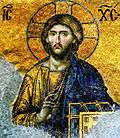Old Calendarists
| Part of a series on |
| Eastern Christianity |
|---|
 |
|
Liturgy and worship |
|
An Old Calendarist is any Orthodox Christian or any Eastern Orthodox Church body which uses the historic Julian calendar (called "Old Style Calendar" or "Church calendar" or "Old Calendar"), and whose Church body is not in communion with the Eastern Orthodox Churches that use the New Calendar. The "Old Calendarists" (who are also sometimes styled "Old Calendar") are to be distinguished from Eastern Orthodox Christians or Eastern Orthodox Church bodies which are on the Old Calendar. The latter use the historic Julian calendar cited above, but are in communion with the Eastern Orthodox Churches that use the New Calendar (the Revised Julian calendar). Thus, to be "Old Calendarist" or "Old Calendar" is not the same thing as being "on the Old Calendar". The Russian Orthodox Church, for instance, is not Old Calendarist (or Old Calendar), but it is on the Old Calendar. There are a great many Eastern Orthodox Christians who are (or who belong to Churches that are) on the Old Calendar, but far fewer in number are the Eastern Orthodox Christians who are Old Calendar or Old Calendarist. It also should not be confused with the Oriental Orthodox churches, all of which are either on the Old Calendar or use their own calendar, but who are not in communion with either the Old Calendarists or mainstream Eastern Orthodoxy, although they are currently engaged in ecumenical dialogue with the latter.
The Julian Calendar is commonly opposed to the Gregorian Calendar introduced to Christianity by the Pope during the 16th century. A revised form of the Julian Calendar, developed by the Serbian astronomer Milutin Milanković, which mostly coincides with the Gregorian one was finally adopted by the Greek Orthodox Patriarchate of Constantinople in 1924 as well as by the autocephalous Church of Greece. A minority of Eastern Orthodox Christians regarded this as a surrender of the Eastern Orthodox Church to the West and to the Pope and continued following the old calendar. Some of these also broke communion with those who had adopted the new calendar, thus creating their own church, or denomination, which means in the Latin "to take a new name".
This schism is the beginning of the Old Calendar Churches which suspended full communion or concelebration with other Eastern Orthodox churches ("New Calendarists") over the adoption by the latter of the Revised Julian calendar (called "New Calendar," although some churches did not specify the details of which New calendar they were adopting). This is the most common use of the term.
Those Eastern Orthodox Churches which remain in full communion with the New Calendarists and yet continue to use the Julian calendar include the Eastern Orthodox Patriarchate of Jerusalem, the Russian Orthodox Church, the Serbian Orthodox Church, and the Georgian Orthodox Church. (The Julian calendar is also used by the Russian Orthodox Church Outside of Russia which has reunited with the Russian Orthodox Church.) Mount Athos, subordinate to the Patriarchate of Constantinople, also follows the Julian Calendar.
See also
External links
- OrthodoxWiki article about the Old Calendarists
- The Ecclesiological Position of the Old Calendar Orthodox Church of Bulgaria, by Bishop Photii of Triaditsa